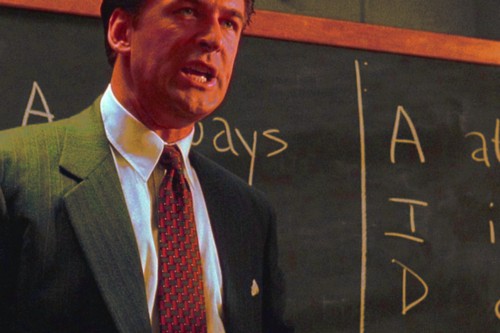今日推荐开源项目:《猫也看不懂 meow》
今日推荐英文原文:《The One Missing Skill for Developers》

今日推荐开源项目:《猫也看不懂 meow》传送门:GitHub链接
推荐理由:众所周知,人类和动物之间一直缺少一种用于沟通的语言。这个项目可以让猫来使用你的编辑器,同时猫打出的文字将会变成猫语显示在屏幕上,这将是人与猫交流沟通的一大进步。唯一的缺陷就是,现在人类无法破译这种语言——而且,猫也看不懂它到底打了啥出来。


今日推荐英文原文:《The One Missing Skill for Developers》作者:DEV.BIZ.OPS
原文链接:https://medium.com/swlh/the-one-missing-skill-for-developers-9406aaad1855
推荐理由:项目完工之后,兴许下一个问题就是如何获得收益了
The One Missing Skill for Developers
Should developers learn how to “sell”?
One of the most memorable lines of any movie in recent years was from an early 90’s cult classic based on a Pulitzer winning play:“Put that coffee down! Closer is for closers only.”Even if you have never watched Glengarry Glen Ross, chances are that you have heard this quote. His nearly seven minute profanity laced monologue has become legendary for its brutal depiction of the sales world and a must watch for anyone in sales. It painted a bleak picture of sales that lives on in the minds of many even today.

No one likes salespeople. I don’t have any data to back up that assertion, but let’s just say that no child ever said “I want to be a salesperson when I grow up”. Other than politicians and ambulance chasing lawyers, there is no more reviled a profession.
Yet we all need salespeople. Without salespeople, there are no companies, because it is only through selling that revenue comes in to fund all the things a company produces. I often have to remind startup founders I advise of this fact. They somehow believe people will just find and automagically buy their super awesome product without any humans.
I cannot blame founders for thinking sales just happen. They are often coders and think everything is something to be engineered, including the process of selling. At the low-end of the market for commodity goods, e-commerce and chatbots have remove direct sales from the equation, but anything that is remotely complex or customized needs salespeople.
Developers do not typically have a good grasp of what salespeople do or how to actually sell. They view sales & marketing as something to shun and not relevant to them or their careers. However Jeff Atwood shared an interesting take on this topic of selling:
All that brilliant code is totally irrelevant until:
- people understand what you’re doing
- people become interested in what you’re doing
- people get excited about what you’re doing
Regardless of the semantics, Jeff is spot on about this one skill being something every developer should know. Yet it is not ever talked about or encouraged because of the emphasis towards hard programming skills. The other skill every software engineer has is the ability to solve problems which involves surfacing and executing on ideas.
Let’s say you have a novel idea to save your company money by improving the speed of code deployments which in turn will accelerate product delivery. Perhaps you have it all worked out and now want to get approval to move forward with this brilliant idea. How do you get started?
Well first you might want to let you manager know. Because your manager is beholden to upper management, you will need your manager’s approval to present the idea. As this will entail both money and resources in other departments, you will need to talk to finance and leaders from the other departments. And because you might need to bring in an outside technology, now you need to reach out to vendor management and legal. Then information security needs to vet the technology for vulnerabilities and compliance needs to ensure that the vendor adheres to certain standards. Ultimately, the executives need to approve your idea from among multiple competing and equally compelling initiatives
How would you go about getting support across all of these groups? Most engineers would reply that they need a business case. Yes, that is certainly true and you need to clearly convey the benefits and the financial justification. But what you really need to do before you share anything is you need to influence the thinking of all the various people you will engage.
Influencing, relationship building, storytelling, speaking to value are all components of what a professional salesperson does. The difference is that you are inside the organization and you do not have “sales” in your title. Even though you may vehemently deny you are “selling”, the fact is that everyone has to sell as some point, whether selling yourself for a job, selling an idea inside a company, or selling your idea of the “perfect” vacation with your significant other.
To be successful in any profession, you need to have sales skills. Whenever you want to enable some change in your organization, you need to leverage these skills to influence and build support for your idea. If you ever wondered how some people rise to leadership roles whereas equally capable people do not, it comes down to the ability to sell.
Even on your team, you need to advocate for your ideas, especially when competing ideas are introduced. During code reviews and standups, there are going to be times you need to make the case as to why your code is best. As Jeff shares:
You probably spent too much time building your code and not enough time as an advocate of your code. Did you explain to people what your code does, why it’s cool and important? Did you offer reasons why your code is going to make their lives better, at least in some small way?Selling is not something that feels natural or obvious for anyone. Sales is learned, much like coding skills. Like coding, the more people practice, the more competent they become. Two books that I have recommended to help non-salespeople understand sales are “To Sell Is Human” by Daniel Pink and “Influence” by Robert Cialdini. The first provides practical tactics anyone can use and the second delves into the science of how influence actually works.
Coding skills are table stakes for developers these days. Jeff agrees:
To truly become a better programmer, you have to cultivate passion for everything else that goes on around the programming.One of those things in the bucket of “everything else” is selling skills. The real differentiator for long-term career and professional success is convincing others why your ideas matter and being more influential.
下载开源日报APP:https://openingsource.org/2579/
加入我们:https://openingsource.org/about/join/
关注我们:https://openingsource.org/about/love/
